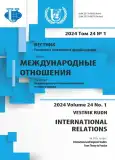Experience of Leading European Global Cities in Attracting Foreign Direct Investments and Labor Migrants: Opportunities for Use in Russia
- Authors: Bulatov A.S.1, Habarta A.A.1, Sergeev E.A.1
-
Affiliations:
- MGIMO University
- Issue: Vol 24, No 1 (2024): International and Regional Studies: From Theory to Practice
- Pages: 142-158
- Section: INTERNATIONAL ECONOMIC RELATIONS
- URL: https://journal-vniispk.ru/2313-0660/article/view/320721
- DOI: https://doi.org/10.22363/2313-0660-2024-24-1-142-158
- EDN: https://elibrary.ru/GBCZSB
- ID: 320721
Cite item
Abstract
This research examines how Russian cities can learn from leading European global cities in attracting foreign direct investment (FDI) and foreign labor migrants. It emphasizes the link between migration and investment flows in global cities specialized in specific services. Global cities play a crucial role in attracting transnational factors of economic growth, with migration being a significant factor. The study analyzes the potential benefits of migration to global cities, including increased trade and capital flows. This benefits both the countries of origin through remittances and the global cities themselves through FDI. European global cities, including London, Paris, Amsterdam, Stockholm, Madrid, Frankfurt, Vienna, Zurich, Dublin, and Berlin, are major centers attracting FDI and labor migrants. Each city has its own specialization and competitive advantages, contributing to the global division of labor. Building on previous research, the study analyzes the attracting factors identified by the City of London for FDI and foreign-born skilled personnel. It aims to identify applicable opportunities for Moscow and St. Petersburg, the leading Russian global cities. While Moscow and St. Petersburg are well-ranked, other Russian cities have limited recognition. The research plans to expand to other Russian global cities, contributing to a comprehensive understanding of global city development. The research explores how Russian cities can leverage the experiences of leading European global cities to attract FDI and foreign labor migrants. By doing so, Russian cities can foster economic growth and enhance their global standing.
Keywords
About the authors
Alexander S. Bulatov
MGIMO University
Email: bulatov.moscow@mail.ru
ORCID iD: 0000-0003-2167-9457
SPIN-code: 1483-8615
PhD, Dr. of Sc. (Economics), Professor, World Economy Department
Moscow, Russian FederationAndrzej A. Habarta
MGIMO University
Author for correspondence.
Email: a.habarta@inno.mgimo.ru
ORCID iD: 0000-0003-4236-3777
SPIN-code: 5009-1533
PhD (Economics), Associate Professor, World Economy Department; Leading Researcher, Center for European Studies, Institute of International Studies
Moscow, Russian FederationEgor A. Sergeev
MGIMO University
Email: sergeev.e.a@my.mgimo.ru
ORCID iD: 0000-0001-9964-9595
SPIN-code: 8073-4744
PhD (Economics), Associate Professor, World Economy Department; Leading Researcher, Center for European Studies, Institute of International Studies
Moscow, Russian FederationReferences
- Arner, D. W. (2009). The competition of international financial centres and the role of law. In K. M. Meessen, M. Bungenberg & A. Puttler (Eds.), Economic law as an economic good, its rule functioning and its tool function in the competition of systems (pp. 193-210). Berlin, New York: Otto Schmidt/De Gruyter European law pub. https://doi.org/10.1515/9783866538580.3.193
- Bang, J. T, & MacDermott, R. (2019). Does FDI attract immigrants? Empirical gravity model approach. International Migration Review, 53(1), 237-253. https://doi.org/10.1177/0197918318768554
- Borjas, G. J. (1989). Economic theory and international migration. International Migration Review, 23(3), 457-485. https://doi.org/10.1177/019791838902300304
- Borjas, G. J. (1990). Friends and strangers: The impact of immigration on the U.S. economy. New York: Basic Books.
- Bulatov, A. (2017). Offshore orientation of Russian Federation FDI. Transnational Corporations, 24(2), 71-89. https://doi.org/10.18356/ed298a0d-en
- Bulatov, A. S., Habarta A. A., & Sergeev, E. A. (2021). The role of European global cities in the inflow of FDI and labor migrants. Contemporary Europe, (4), 95-106. (In Russian). http://dx.doi.org/10.15211/soveurope4202195106
- Bulatov, A. S., Habarta, A. A., & Sergeev, E. A. (2020). Global cities of external Europe as FDI objects. Outlines of Global Transformations: Politics, Economics, Law, 13(6), 122-137. (In Russian). https://doi.org/10.23932/2542-0240-2020-13-6-7
- Castles, S., de Haas, H., & Miller, M. J. (2014). The age of migration: International population movements in the modern world. London: Palgrave Macmillan.
- Cuados, A., Martín-Montaner, J., & Paniagua, J. (2019). Migration and FDI: The role of job skills. International Review of Economics & Finance, 59, 318-322. https://doi.org/10.1016/j.iref.2018.09.007
- Katona, K., Árva, L., & Schlett, A. (2013). Stages of globalisation: Alternative ways from Eastern Europe and the Far East. Bratislava: Kalligram.
- Lebedeva, M. M. (2019). Transformation of the role of cities and domestic regions in world politics. Ojkumena. Regional Researches, (1), 7-16. (In Russian). https://doi.org/10.24866/1998-6785/2019-1/7-16
- Matveevskaya, A. S., & Pogodin, S. N. (2019). St. Petersburg’s experience in resolving of urban national conflicts. Vestnik of Saint Petersburg University. Philosophy and Conflict Studies, 35(2), 349-357. https://doi.org/10.21638/spbu17.2019.210
- Palan, R. (2015). The second British Empire: The British Empire and the reemergence of global finance. In S. Halperin & R. Palan (Eds.), Legacies of empire imperial roots of the contemporary global order (pp. 46-68). Cambridge: Cambridge University Press. https://doi.org/10.1017/CBO9781316271674
- Piore, M. J. (1979). Birds of passage: Migrant labour and industrial societies. Cambridge: Cambridge University Press. https://doi.org/10.1017/CBO9780511572210
- Sassen, S. (1999). Global financial centers. Foreign Affairs, 78(1), 75-87. https://doi.org/10.2307/20020240
- Sassen, S. (2001). The global city: New York, London, Tokyo. Princeton: Princeton University Press. https://doi.org/10.2307/j.ctt2jc93q
- Sluka, N. A., Karyakin, V. V., & Kolyasev, E. F. (2020). Global cities as the hubs of new transnational actors. Outlines of Global Transformations: Politics, Economics, Law, 13(1), 203-226. (In Russian). https://doi.org/10.23932/2542-0240-2020-13-1-11
- Tedeschi, M., Vorobeva, E., & Jahiainen, J. S. (2022). Transnationalism: Current debates and new perspectives. GeoJournal, 87(2), 603-619. https://doi.org/10.1007/s10708-020-10271-8
- Volkov, A. (2018). Foreign investments in the economy of Sankt-Petersburg and Leningrad region. World Economy and International Relations, 62(6), 67-76. (In Russian). https://doi.org/10.20542/0131-2227-2018-62-6-67-76
Supplementary files









